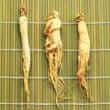Background
- Siberian ginseng (Eleutherococcus senticosus) is a small, woody shrub in the Araliaceae family native to northeastern Asia. Although it is not related to true ginseng (Panax ginseng), the name Siberian ginseng became popular based on potential effects similar to Panax ginseng. Siberian ginseng is also referred to by its genus name, Eleuthero, in some products.
- Siberian ginseng has long been used in Asia for various indications, possibly dating back over 2,000 years in China. It has also been historically used in Russia. Traditionally, Siberian ginseng has been used as an herb to increase the body's ability to defend against stress, trauma, anxiety, and fatigue, and has been termed an "adaptogen" for these uses. It has also been suggested as a therapy for increased endurance and memory improvement, as well as for protection against cancer, enhancement of the immune system, and overall well-being.
- In general, research does not support use of Siberian ginseng for enhanced athletic performance. There is some evidence to suggest increased immune response.
References
Natural Standard developed the above evidence-based information based on a thorough systematic review of the available scientific articles. For comprehensive information about alternative and complementary therapies on the professional level, go to . Selected references are listed below.
- Amaryan, G., Astvatsatryan, V., Gabrielyan, E., et al. Double-blind, placebo-controlled, randomized, pilot clinical trial of ImmunoGuard--a standardized fixed combination of Andrographis paniculata Nees, with Eleutherococcus senticosus Maxim, Schizandra chinensis Bail. and Glycyrrhiza glabra L. extracts in patients with Familial Mediterranean Fever. Phytomedicine. 2003;10(4):271-285.
View Abstract - Asano, K., Takahashi, T., Miyashita, M., et al. Effect of Eleutherococcus senticosus extract on human physical working capacity. Planta Med 1986;(3):175-177.
View Abstract - Cicero, A. F., Derosa, G., Brillante, R., et al. Effects of Siberian ginseng (Eleutherococcus senticosus maxim.) on elderly quality of life: a randomized clinical trial. Arch Gerontol.Geriatr Suppl 2004;(9):69-73.
View Abstract - Dowling, E. A., Redondo, D. R., Branch, J. D., et al. Effect of Eleutherococcus senticosus on submaximal and maximal exercise performance. Med Sci.Sports Exerc. 1996;28(4):482-489.
View Abstract - Eschbach, L. F., Webster, M. J., Boyd, J. C., et al. The effect of siberian ginseng (Eleutherococcus senticosus) on substrate utilization and performance. Int J Sport Nutr Exerc Metab 2000;10(4):444-451.
View Abstract - Goulet, E. D. and Dionne, I. J. Assessment of the effects of eleutherococcus senticosus on endurance performance. Int J Sport Nutr Exerc.Metab 2005;15(1):75-83.
View Abstract - Hartz, A. J., Bentler, S., Noyes, R., et al. Randomized controlled trial of Siberian ginseng for chronic fatigue. Psychol.Med 2004;34(1):51-61.
View Abstract - Kormosh, N., Laktionov, K., and Antoshechkina, M. Effect of a combination of extract from several plants on cell-mediated and humoral immunity of patients with advanced ovarian cancer. Phytother Res 2006;20(5):424-425.
View Abstract - Kropotov, A. V., Kolodnyak, O. L., and Koldaev, V. M. Effects of Siberian ginseng extract and ipriflavone on the development of glucocorticoid-induced osteoporosis. Bull.Exp.Biol.Med 2002;133(3):252-254.
View Abstract - Medon, P. J., Thompson, E. B., and Farnsworth, N. R. Hypoglycemic effect and toxicity of Eleutherococcus senticosus following acute and chronic administration in mice. Zhongguo Yao Li Xue.Bao. 1981;2(4):281-285.
View Abstract - Mkrtchyan, A., Panosyan, V., Panossian, A., et al. A phase I clinical study of Andrographis paniculata fixed combination Kan Jang versus ginseng and valerian on the semen quality of healthy male subjects. Phytomedicine. 2005;12(6-7):403-409.
View Abstract - Narimanian, M., Badalyan, M., Panosyan, V., et al. Randomized trial of a fixed combination (KanJang) of herbal extracts containing Adhatoda vasica, Echinacea purpurea and Eleutherococcus senticosus in patients with upper respiratory tract infections. Phytomedicine 2005;12(8):539-547.
View Abstract - Newton, K. M., Reed, S. D., Lacroix, A. Z., et al. Treatment of vasomotor symptoms of menopause with black cohosh, multibotanicals, soy, hormone therapy, or placebo: a randomized trial. Ann.Intern.Med 12-19-2006;145(12):869-879.
View Abstract - Perfect, M. M., Bourne, N., Ebel, C., et al. Use of complementary and alternative medicine for the treatment of genital herpes. Herpes. 2005;12(2):38-41.
View Abstract - Rogala, E., Skopinska-Rozewska, E., Sawicka, T., et al. The influence of Eleuterococcus senticosus on cellular and humoral immunological response of mice. Pol.J Vet.Sci. 2003;6(3 Suppl):37-39.
View Abstract







